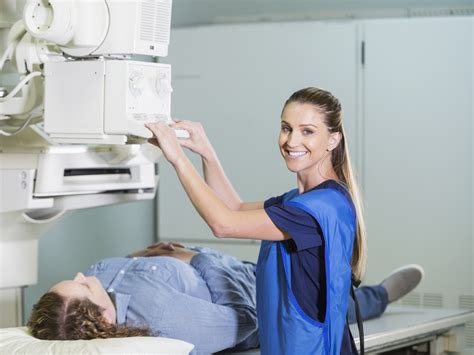Licensed Practical Nurses (LPNs) and Licensed Vocational Nurses (LVNs) play a vital role in the healthcare industry, providing essential care to patients in various settings. However, some LPNs may be interested in exploring new career opportunities that offer challenges, better pay, and more opportunities for advancement. One such field is radiology technology, which involves using imaging equipment to help diagnose and treat medical conditions. In this article, we will discuss five ways LPNs can transition to a career in radiology technology.
Radiology technology is a fascinating field that combines patient care, technical skills, and problem-solving. As a radiologic technologist, you will be responsible for operating imaging equipment, positioning patients, and ensuring that images are of high quality. This career path requires strong communication skills, attention to detail, and the ability to work well under pressure.
If you are an LPN looking to transition to a career in radiology technology, here are five ways to make the move:
1. Earn an Associate's Degree in Radiologic Technology

One of the most direct ways to transition to a career in radiology technology is to earn an Associate's degree in Radiologic Technology. This two-year program will provide you with the necessary education and training to become a radiologic technologist. You will study courses such as patient assessment, radiographic positioning, and imaging modalities.
Many community colleges and universities offer Associate's degree programs in Radiologic Technology that are accredited by the Joint Review Committee on Education in Radiologic Technology (JRCERT). These programs include classroom instruction, lab training, and clinical experience.
Benefits of an Associate's Degree Program
- Provides comprehensive education and training in radiologic technology
- Prepares you for the American Registry of Radiologic Technologists (ARRT) certification exam
- Offers clinical experience and hands-on training
- Can be completed in two years
2. Pursue a Bachelor's Degree in Radiologic Sciences

If you are interested in advancing your education and career prospects, you may consider pursuing a Bachelor's degree in Radiologic Sciences. This four-year program will provide you with advanced education and training in radiologic technology, as well as courses in management, education, and research.
A Bachelor's degree in Radiologic Sciences can prepare you for leadership roles, education positions, or research careers in radiologic technology.
Benefits of a Bachelor's Degree Program
- Provides advanced education and training in radiologic technology
- Prepares you for leadership roles, education positions, or research careers
- Offers courses in management, education, and research
- Can be completed in four years
3. Complete a Radiologic Technology Certificate Program

If you already have an Associate's degree in a related field, such as nursing or healthcare, you may consider completing a Radiologic Technology certificate program. This program will provide you with the necessary education and training to become a radiologic technologist.
Certificate programs in Radiologic Technology are typically one to two years in length and include coursework, lab training, and clinical experience.
Benefits of a Certificate Program
- Provides specialized education and training in radiologic technology
- Can be completed in one to two years
- Offers clinical experience and hands-on training
- Prepares you for the ARRT certification exam
4. Gain Experience through Volunteer Work or Internships

Gaining experience through volunteer work or internships is an excellent way to transition to a career in radiology technology. You can volunteer or intern at hospitals, imaging centers, or clinics to gain hands-on experience and build your network.
Volunteer work or internships can provide you with valuable experience and skills, such as patient care, technical skills, and problem-solving.
Benefits of Volunteer Work or Internships
- Provides hands-on experience and skills
- Builds your network and job prospects
- Offers a competitive edge when applying for radiologic technology programs
- Can be completed in a few months to a year
5. Consider a Career as a Radiology Nurse

If you are an LPN interested in transitioning to a career in radiology, you may consider becoming a radiology nurse. Radiology nurses work in imaging departments, providing patient care and assisting with imaging procedures.
As a radiology nurse, you will work closely with radiologic technologists and other healthcare professionals to ensure that patients receive high-quality care.
Benefits of a Career as a Radiology Nurse
- Provides a unique blend of patient care and technical skills
- Offers a competitive salary and benefits package
- Can be a stepping stone to advanced education and career opportunities
- Provides a sense of job satisfaction and fulfillment
Gallery of Radiologic Technology






What is the average salary for a radiologic technologist?
+The average salary for a radiologic technologist varies depending on location, experience, and employer. However, according to the Bureau of Labor Statistics, the median annual salary for radiologic technologists was $62,760 in May 2020.
What is the job outlook for radiologic technologists?
+According to the Bureau of Labor Statistics, employment of radiologic technologists is projected to grow 9% from 2020 to 2030, faster than the average for all occupations.
What are the education requirements for radiologic technologists?
+Radiologic technologists typically need an Associate's degree or a postsecondary certificate in radiologic technology. Some colleges and universities also offer Bachelor's degree programs in radiologic sciences.
We hope this article has provided you with valuable information on transitioning to a career in radiology technology. Whether you choose to earn an Associate's degree, pursue a Bachelor's degree, complete a certificate program, gain experience through volunteer work or internships, or consider a career as a radiology nurse, there are many paths to a rewarding career in radiology technology.
